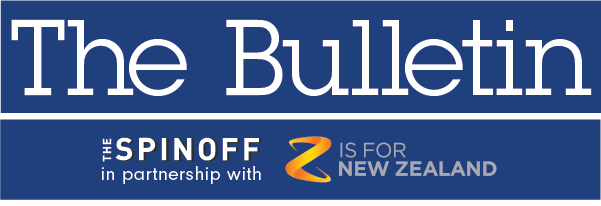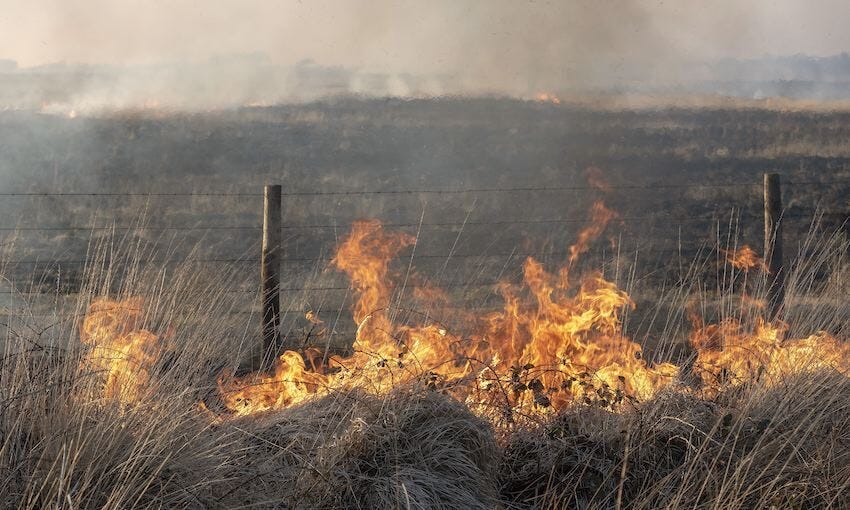Climate change already happening, says new report
It's not something hypothetical for the future, the effects are being seen now

Good morning and welcome to The Bulletin for Wednesday 21 October, by Alex Braae for The Spinoff. Presented in partnership with Z Energy.
In today’s edition: New report shows climate change already affecting New Zealand, new crop of managed isolation Covid cases, and National leader and ousted electorate MPs all staying on.

(Getty Images)
As promised, today's Bulletin will cover the government's new climate change report, called Our Atmosphere and Climate. It was released just before the election, so rather than giving it a once over lightly, it's worth looking at in more depth – after all, it's quite an important issue.
And it's an issue that is playing out now, not at some hypothetical point in the future. As the NZ Herald's Jamie Morton reports, places all over New Zealand are already seeing more hot days than normal, in both summer and winter. Drought frequency is increasing, and frost days are decreasing. At the same time, rainfall patterns are changing, which combines to change growing seasons for crops. We're also seeing an increase in wildfires, with longer fire seasons and worse conditions for firefighters to work in. And to reiterate the central point of that article, this is all happening now – not next decade, not in a century, but right in front of our eyes.
The increased fire risk is worth unpacking further, because it's one of the effects of climate change that can destroy lives and livelihoods in an instant. Newshub's Rosie Gordon and Vita Molyneux headlined their report with this, in particular highlighting that regions that aren't accustomed to fires will see a much higher risk over the coming years. By 2040, "Wellington would see its fire danger double, and coastal Otago would triple," is one rather jarring line. Professional firefighters were talking about being stretched last year, let alone the rural volunteer brigades.
The decisions made on climate by the incoming government will have far-reaching implications for the country for decades. Newsroom's Marc Daalder has analysed where those decisions will take place, primarily around emissions budgets and targets under both NZ law and international agreements. And of course achieving emissions reductions is imperative, both for New Zealand and the world. But there's a point very well made in this Stuff op-ed about how the conversation must also include adaptation for the changes already taking place. That involves both planning and getting real about what's on the way.
For more expertise on this, the Science Media Centre continues to be an invaluable resource. A particularly pertinent comment in their roundup, from professor James Renwick: “The changing climate affects our physical and mental health through the effects of extreme weather, changing patterns of disease, and the emotional stresses associated with extreme events. There are also multiple effects on ecosystems and biodiversity, on our economy and on communities nationwide."
Almost a dozen international fishermen have Covid-19 in managed isolation in Christchurch, reports Stuff. 11 people in total have tested positive, and another 14 are under investigation. All had tested negative before their flights, and the positive cases were picked up in routine day 3 testing. The risk of community transmission as a result of the incident is low, and the hotel they're all staying in has been locked down as a precaution.
Judith Collins will stay as leader, and defeated electorate MPs Gerry Brownlee and Nick Smith have no plans to leave parliament. Those are the top lines from National's post-caucus press conference yesterday, in which various MPs also pledged their total loyalty to Collins as leader. Radio NZ reports there will be a campaign review, which will include a listening tour of members and supporters to figure out how to reconnect with voters who the party lost. No decisions about portfolios have been made yet. On the subject of the campaign, this from Politik goes deep into where things went wrong, and why Collins spent the last week of it absolutely flailing and failing to connect.
Also at parliament, the Greens and Labour are currently having talks about how they'll work together, but they're not really talking about it openly. Justin Giovannetti is back down there and reports that no comment is the order of the day. Meanwhile, Tova O'Brien has a 'Newshub understands' sort of story (when stories are written like that the presumption is that sources have spoken off the record) contending that Labour will not offer the Greens a formal coalition.
Sexual assault survivors in Wellington are being urged to come forward to police, after widespread reports relating to the music industry were aired on social media. Our live updates reports survivor advocate Louise Nicholas has assured them that it is safe to do so. The police say they have received "a small number" of formal complaints so far, and have opened an investigation.
There's been some outstanding Wellington issues coverage in the last week, so to keep it fair I'm going to give a shout to two strong competitors. Georgina Campbell from the NZ Herald has reported on the looming 'sludge crisis', with a $185 million bill to fix wastewater issues, including a plan to reduce the volumes heading out to sea. And the Dominion Post's Joel MacManus has looked at the post-election considerations for the Let's Get Wellington Moving transport package, particularly in relation to the differing priorities between Labour and the Greens.
Even more election stuff on The Spinoff: Mariner Fagaiava-Muller writes about what the election means for Pasifika people, and whether a change in the community's parliamentary representatives matters. Tara Ward investigates how former Nelson MP came to have a billboard on the wall promising strong tea and better scones. José Barbosa wraps the election night coverage as only he can. And Madeleine Chapman concludes an incredible series of wrapping each political week in memes.
Got some feedback about The Bulletin, or anything in the news?
Drop us a line at thebulletin@thespinoff.co.nz

Right now on The Spinoff: On the Rag is back with a brand new episode about imposter syndrome and how to get past it. Some very smart people look at the impact of Covid-19, and how it has changed New Zealand forever – some of these observations are really insightful and haven't really been talked about in other places. Journalist Shilo Kino writes about releasing her debut young adult novel, in an incredible essay about how Māori stories are written out of wider narratives. Teuila Fuatai meets comedian Tofiga Fepulea’i from the Laughing Sāmoans, who is heading back out to resume his Covid-interrupted tour. Michael Andrew writes about Allbirds releasing a new shirt made partly from crab shells. And Charlotte Muru-Lanning writes about soil health, and why we need to stop treating it like dirt.
For a feature today, a look at a weird looking safety practice that starts to make a lot of sense once you read more. A while ago Atlas Obscura wrote about why Japanese train workers point at everything constantly when doing otherwise simple tasks. It turns out, it can make a big difference to avoiding equally simple, and potentially catastrophic mistakes. Here's an excerpt:
The system is in place across a number of industries in Japan. Originally developed by the now-defunct Kobe Railroad Administration Bureau in the late Meiji Period (the early 20th century), pointing-and-calling is known to reduce workplace errors by up to 85 percent, according to one 1996 study. While some workers point-and-call more enthusiastically than others, even those who are more blasé benefit from the increased awareness that comes from physically reinforcing each task.
For such a simple but effective method of improving workers’ error rate, the system continues to find itself largely confined to Japan. Indeed, it is one of the many quirks of the Japanese workplace that fall flat with Western workers. In the case of pointing-and-calling, Japanese commentators have theorized that Western employees feel “silly” performing the requisite gestures and calls.
There could be a debutant for the Silver Ferns in their upcoming domestic competition and series against England, with Mystics teenager Grace Newke called into the wider squad. Stuff reports it has been a rapid rise for Nweke, who wasn't part of the earlier squad this season. The side will be lacking a bit of experience, with Bailey Mes, Temalisi Fakahokotau and Katrina Rore all ruled out.
That's it for The Bulletin. If you want to support the work we do at The Spinoff, please check out our membership programme




